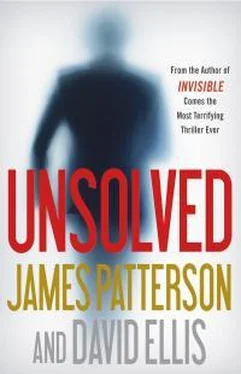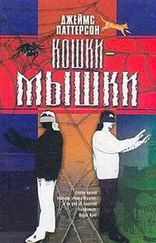“You have to work on it. I see.”
“Books—”
“How was New Orleans?” he snaps, his eyes ablaze, as if that’s some kind of comeback, as if that has anything to do with what we’re discussing.
“It was…fine.” I look away. I do not like lying to Books. It’s one thing not to volunteer information about what I’m doing in my spare time. It’s another thing altogether to flat-out lie. A relationship is constructed slowly, like a house, and every lie is a stone pulled loose from the foundation.
And it’s not the only lie I’ve told him.
Books abruptly gets to his feet and collects his shirt and jeans. “I’ll get us some wine,” he says.
“Hey,” I call to him, but he’s already disappeared into the kitchen.
I have to tell him. I have to tell him that I’m hunting another serial killer. I know everything he’s going to say, every objection he’s going to raise, the knock-down, drag-out argument we’re going to have, but I’m going to tell him anyway. I have to.
This weekend, I promise myself. I’ll tell him this weekend.
22
SUNDAY MORNING, rain is falling…
Books can’t get the song out of his head as he looks out the window dotted with long raindrops at the gray sky. Ordinarily, there are few things Books enjoys more than lazy, damp Sundays curled up in bed with Emmy, reading the paper and sipping coffee and feeling the warmth of Emmy under the covers.
Not so much this Sunday.
He’s removed the wet plastic sleeve from the Sunday Post, and there are a few thick stains of wetness on the front page but nothing that obscures this headline:
Citizen David Targeting NYC?
Once again written by Shaindy Eckstein.
Books reaches into the back of the kitchen cabinet and removes the burner phone he was given by Director Moriarty. It has been turned off and stashed away all weekend. He couldn’t risk Emmy seeing it, much less reading anything that might be on it.
Knowing that he is hiding something from her burns his throat like harsh medicine. He reminds himself that he’s trying to protect her, trying to ensure a fair investigation.
No, he thinks, it’s not that. His own guilt is a diversion, focusing him on his role in all of this. The problem is the why, the reason there’s an investigation in the first place. The problem is that the Bureau has turned its considerable resources on Emmy, that she has a target planted on her back.
That he is losing her. That she is losing herself, jumping from the airplane and refusing to pull the cord for the parachute.
He listens for any sound of Emmy moving upstairs but hears nothing. It’s only six thirty in the morning. Emmy usually sleeps well past this time. She sleeps hard and long on the weekends. She comes to him on Friday nights beaten and exhausted. It’s not hard to imagine why—she works endless hours and gets almost no sleep during the week. Even though she has assured him—lied to him—that this isn’t the case anymore, that she has scaled back.
He powers up the burner phone. The screen comes to life. The first new text message is time-stamped Friday at 5:25 p.m.
She just met with SE at Deadline, quick conversation and left.
Books feels a slow burn through his chest. She must have come straight from that meeting with Shaindy Eckstein to his house. He’d thought he’d tasted wine on her mouth when he first kissed her, but he was too busy ripping off her clothes to think much of it.
Friday, happy hour, she meets with Shaindy. Sunday morning, Shaindy is revealing the Bureau’s thoughts on Citizen David’s plans.
He pictures agents following Emmy, clicking photo after incriminating photo of her whispering to a Washington Post reporter in a popular, crowded bar.
His heart asks him, Why would she do this in plain sight of hundreds of onlookers? His brain answers, It’s the perfect place, lost in a crowd, a brief stolen moment that could easily be passed off as a quick hello, small talk.
“Oh, Emmy,” he whispers, “please don’t let it be true.”
The second new text message is from this morning, less than an hour ago:
We’re going to have to act on this.
Followed by a link. Books clicks on it. It’s an article from the Times-Picayune .
FBI Links Local Death to Serial-Killer Spree
The article notes that FBI analyst Emmy Dockery, known for her hunt and capture of the notorious serial killer Graham, was dispatched to New Orleans to investigate the seemingly accidental death of Nora Connolley.
She talked to a reporter when she was down there? Books wonders. If so, he doubts it was by choice. She was probably accosted, a reporter with a camera and recorder following her doggedly.
But it doesn’t matter. Her secret—one of them—is out now. Books can’t pretend not to know. The Bureau won’t be able to feign ignorance. Something will break as a result.
He finds himself constructing a scenario that would solve all of this: Emmy is kicked out of the Bureau over this new serial-killer search of hers, thus depriving her of access to the Citizen David investigation. There are no more leaks. The people at the Bureau will think, She’s gone and the leaks have stopped, but the proof of her leaking isn’t conclusive, so maybe we’ll just leave it at that and be glad it’s over.
Yeah, sure—and maybe his car will turn into a pumpkin at midnight, and the glass slipper will fit Emmy’s foot.
But he goes over it in his mind, his fantasy solution, praying that some scenario like that will play out and make everything better, that Emmy will snap out of this funk and get her head straight.
Something, anything, to make this nightmare go away.
23
HIS INSIDES still burning, Books walks into the bedroom with the Sunday paper under his arm, holding two empty mugs and a pot of coffee. Primed for an argument, loaded for bear, he pauses as he watches Emmy sleeping.
So tranquil, so defenseless. Emmy has had little peace since the attack by Graham, between the pain and the nightmares and the panic attacks and her obsessive need to continue her work and find the next serial-killer-eluding-detection. She has changed. It would be impossible not to. He has tried to hold her hand throughout this process, but she has, for the most part, yanked her hand free and demanded that he let her find her own way. Maybe he has failed her.
But maybe this is beyond his control. During his tenure in law enforcement, first as a cop and then with the Bureau, he saw the toll that violent crime took not just on the victim but on family and friends. He saw how the death of a child could destroy a marriage. He saw how vicious attacks completely changed some people, made them unable to cope with the new reality suddenly forced on them. He saw victims of crime leave their spouses, quit their jobs, completely reverse course on issues like religion or politics, take up or give up various pursuits or, in some cases, give up altogether.
Maybe, due to forces beyond their control, he and Emmy never had a chance after she was attacked. But he refuses to believe it.
Emmy moans and rolls her head from side to side on the pillow, her eyelids fluttering. Is she dreaming? Is it a nightmare? Is she about to start screaming No, no, no! before opening her eyes wide, frightened and disoriented?
Her hair is mussed and flattened on one side, and she’s wearing nothing but a V-neck T-shirt, so Emmy’s scars, the ones she goes to great lengths to obscure, are plain as day. The scars from the sutures along her hairline. The skin grafts on her chest and neck to repair the second-degree burns she received. Asleep, unguarded, she looks so much like the very thing she refuses to see herself as—a victim.
Читать дальше












